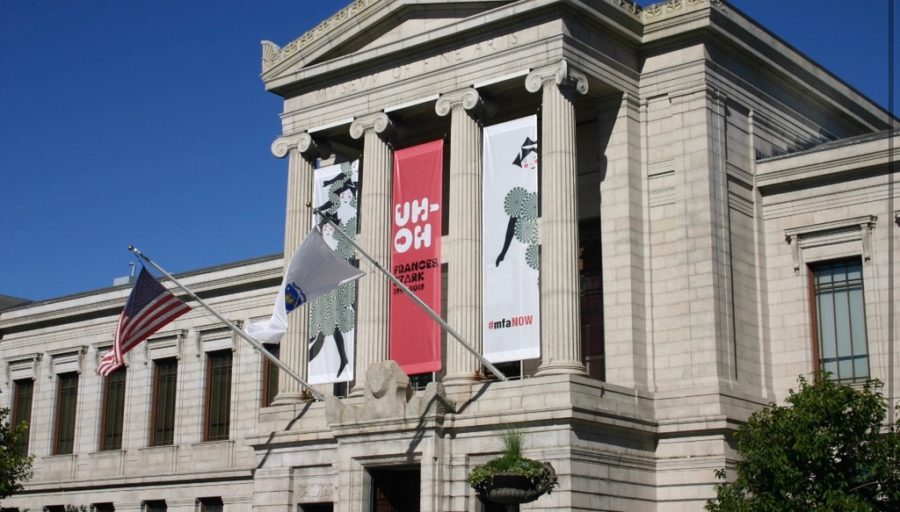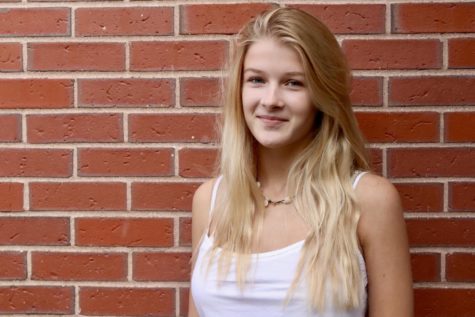Increasing cultural experience through field trips
Credit: Courtesy of Marina Felix
Pictured above is the Museum of Fine Arts in Boston. Despite the busy school schedules of students, the language department is able to hold many enriching field trips each school year. “A lot of times, I feel like these field trips are for the opportunity to make a connection elsewhere,” Bryant said. “Sometimes, it leads to something great, which is kind of neat.”
April 11, 2019
In Wayland students’ elementary and middle school years, field trips are abundant. Students highly anticipate trips like visiting Washington D.C., Kimball Farms, Plymouth Plantation and the North End in Boston and consider them the highlight of their primary school career. However, as students enter WHS, the presence of field trips is diminished as schedules become more and more complicated. One department, however, has continually stressed the importance of out-of-classroom experiences.
The language department is host to four language classes: Spanish, French, Latin and Mandarin. Because of the variety of languages, different classes go to different places and have different experiences.
One of the recent field trips that occurred was Spanish Immersion Day.” Students traveled to Acton-Boxborough Regional High School and spoke Spanish for the entire day.
“We had a plan with Acton students that our students could get together with theirs and be immersed in the language for a day and see what it really feels like because we don’t get to [speak Spanish for more than an hour at a time] except [for] people who get to travel or are on exchanges or trips,” language department head Melissa Bryant said. “It was a connection with other students, a way to enjoy the language and have fun with it [and a way] to be immersed in a way which we can’t get in a classroom.”
French students also had an out-of-classroom experience. The French curriculum consists of not only learning about the language but also the culture, which brought about the Impressionism unit. Because of this unit, French teachers brought students to the Museum of Fine Arts to look at and learn more about Impressionist paintings.
“[The French teachers] took them and had a person explain it further, and it sort of enhanced what they’re able to do in the classroom about it,” Bryant said. “Then, they’re able to go and learn from an expert and not just see stuff on a computer and be able to extend it further.”
The Mandarin students took a field trip to Brandeis University to see what taking college-level Mandarin would be like. According to Bryant, all of these experiences, although serving as an interruption to students’ schedules, were essential because they provided vital immersion experiences that students wouldn’t be able to get in class.
“People might come to me and ask me if they think it’s an okay or [a] valid idea to take someone because we know the ramifications that kids are out of other classes and it’s a disruption to the schedule, so we want to make sure that it’s an experience that they can’t get in the classroom that they really need to leave school to have,” Bryant said. “It’s kind of like choosing to do something on the computer instead of on paper. It should enhance the experience for some reason. We want to make sure that they’re doing it for a goal that can’t really be reached as well in the classroom.”
Sophomore Victoria Andreasen has been taking two languages, Spanish and French, since the eighth grade. She was able to experience each languages’ respective field trips.
“I think I definitely [learned new things],” Andreasen said. “For the Spanish trip, I definitely learned because I got extra practice with students from outside WHS. For the French trip, after doing a whole unit, I could connect what we saw to what we did in class, which was cool.”
Some of these field trips help out not only the students but also the community they visit. Every year, the World Language Club and the National Spanish Honors Society will take service trips and put their language skills to use by interacting with the community.
Every year for the last 16 years, the students have gone to Sunrise Senior Living to sing holiday songs in multiple languages. Along with that, this school year, they visited the Yawkey Konbit Kreyol Center, a daycare in Dorchester that looks after underprivileged children. They brought a Santa Claus, presents and multiple games and activities.
“The spirit of service is great,” Bryant said. “The students are always so happy, and they love being with the children more than their teacher.”
Junior Samantha Baron currently takes Spanish. Earlier this year, she went on the Spanish field trip to Dorchester.
“It was nice to help out those in need, and the kids were really excited,” Baron said. “I think learning in a different environment is helpful because it allows you to apply the skills you have learned in the classroom.”
Bryant emphasizes the connection that language students have with these field trips, as it not only provides them with unique educational opportunities but also gives them the chance to connect with the community outside of WHS.
“A lot of times, I feel like these field trips are for the opportunity to make a connection elsewhere,” Bryant said. “Sometimes, it leads to something great, which is kind of neat.”





![Last Wednesday, the Wayland School Committee gathered to discuss a number of topics regarding the health curriculum and Innovation Career Pathway course. Another large topic of conversation was the ways to potentially mitigate distracting cell phone usage. "These [phones] are going to distract your learning and social relationships," Superintendent David Fleishman said. "That's concrete right there."](https://waylandstudentpress.com/wp-content/uploads/2025/06/Screenshot-2025-06-04-at-9.49.31 PM-1200x886.png)



























![Troy Hoyt finishes the Boston Marathon, running for the Hoyt Foundation. T. Hoyt is the son of Hoyt Foundation CEO Russ Hoyt.
“[Running a marathon] might seem like a big thing, when it’s presented to you at first, but if you break it up and just keep telling yourself, “Yes, you can,” you can start chipping away at it. And before you know it, you’ll be running the whole 26 miles, and you won’t even think twice about it.” T. Hoyt said.](https://waylandstudentpress.com/wp-content/uploads/2025/04/C36E8761-1CBB-452E-9DF2-543EF7B1095E_1_105_c.jpeg)













































